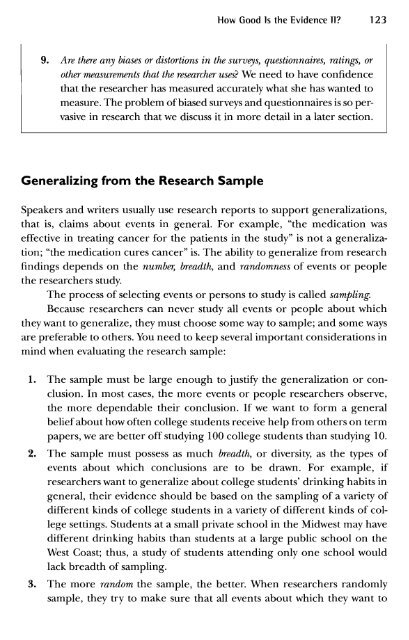Asking the Right Questions, A Guide to Critical Thinking, 8th Ed
Asking the Right Questions, A Guide to Critical Thinking, 8th Ed
Asking the Right Questions, A Guide to Critical Thinking, 8th Ed
You also want an ePaper? Increase the reach of your titles
YUMPU automatically turns print PDFs into web optimized ePapers that Google loves.
How Good Is <strong>the</strong> Evidence 11? 123<br />
9. Are <strong>the</strong>re any biases or dis<strong>to</strong>rtions in <strong>the</strong> surveys, questionnaires, ratings, o<br />
o<strong>the</strong>r measurements that <strong>the</strong> researcher uses} We need <strong>to</strong> have confidence<br />
that <strong>the</strong> researcher has measured accurately what she has wanted <strong>to</strong><br />
measure. The problem of biased surveys and questionnaires is so pervasive<br />
in research that we discuss it in more detail in a later section.<br />
Generalizing from <strong>the</strong> Research Sample<br />
Speakers and writers usually use research reports <strong>to</strong> support generalizations,<br />
that is, claims about events in general. For example, "<strong>the</strong> medication was<br />
effective in treating cancer for <strong>the</strong> patients in <strong>the</strong> study" is not a generalization;<br />
"<strong>the</strong> medication cures cancer" is. The ability <strong>to</strong> generalize from research<br />
findings depends on <strong>the</strong> number, breadth, and randomness of events or people<br />
<strong>the</strong> researchers study.<br />
The process of selecting events or persons <strong>to</strong> study is called sampling.<br />
Because researchers can never study all events or people about which<br />
<strong>the</strong>y want <strong>to</strong> generalize, <strong>the</strong>y must choose some way <strong>to</strong> sample; and some ways<br />
are preferable <strong>to</strong> o<strong>the</strong>rs. You need <strong>to</strong> keep several important considerations in<br />
mind when evaluating <strong>the</strong> research sample:<br />
1. The sample must be large enough <strong>to</strong> justify <strong>the</strong> generalization or conclusion.<br />
In most cases, <strong>the</strong> more events or people researchers observe,<br />
<strong>the</strong> more dependable <strong>the</strong>ir conclusion. If we want <strong>to</strong> form a general<br />
belief about how often college students receive help from o<strong>the</strong>rs on term<br />
papers, we are better off studying 100 college students than studying 10.<br />
2. The sample must possess as much breadth, or diversity, as <strong>the</strong> types of<br />
events about which conclusions are <strong>to</strong> be drawn. For example, if<br />
researchers want <strong>to</strong> generalize about college students' drinking habits in<br />
general, <strong>the</strong>ir evidence should be based on <strong>the</strong> sampling of a variety of<br />
different kinds of college students in a variety of different kinds of college<br />
settings. Students at a small private school in <strong>the</strong> Midwest may have<br />
different drinking habits than students at a large public school on <strong>the</strong><br />
West Coast; thus, a study of students attending only one school would<br />
lack breadth of sampling.<br />
3. The more random <strong>the</strong> sample, <strong>the</strong> better. When researchers randomly<br />
sample, <strong>the</strong>y try <strong>to</strong> make sure that all events about which <strong>the</strong>y want <strong>to</strong>



